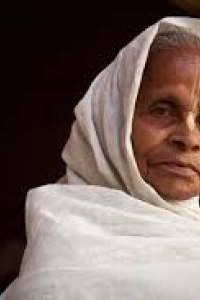
She dismounted from the PCR (Production Control Room) van quite like a tigress on a prowl and scurried through the famous labyrinths of Banaras towards us. Since the PCR could not be driven in through the choked lanes, she preferred to walk; no actually sprint through the suffocating mazes of the holy city. In no time she stood next us, inside our courtyard with her crew of media people; visibly in control of the directives. Though dishevelled, a blue Reynolds pen was holding on her thick black tresses from free falling. The blue sling of the valuable media identity card ran through her long neck on to the indigo Ajrakh printed kurta.
Of all the widows seated, wonder why she choose to sit next to me and pose all the ‘news breaking’ questions to me. Was she under the delusion that I might give her some juicy scoops from the real Banaras? Or was she thinking that I looked to be the deprived, desolate and depressed widow of the real Banaras. But in a short while, once again resoundingly, I was taken back to real self.
Paddy? Long short? - With a thumbs up signal, asked a fellow media person to the young lanky girl who had mesmerised me with her display of independence and authority. A virtue which was brutally snatched away from me.
Basu! Come’on, you know it. Let’s get rolling – went the resounding voice of the otherwise diminutive girl all across the ashram.
Paddy angled her weapon of freedom towards me and fired – Mataji, are you happy with the promises that the newly elected MLA has made for the widows of Banaras. Will the sanctioned schemes, make you financially stable? Do you think you will have more independence and can hope to live with honour?’
While she was still to complete her question, my eyes were captured by the personal details of the reporter. Once again the indigo Ajrakh print could not camouflage the visible authority the reporter had. Name – Parvathi M Padmanabhan. Designation – Reporter, News Now Channel.
Why did she call me Mataji? I too have a name. It is Parvathi M Padmanabhan. That is what my birth certificate and school certificate says. And by the way, I must be as old as her. Then why this octogenarian honour?
Arre!! Pinky, Madam from the news channel has asked you a question, reply to her – whispered a frail widow sitting on my right side, arranging her pale white saree pleats.
That’s right, my name is Pinky not Parvathi and how could I forget the unfortunate day when my name was changed because of some unknown person’s impulse. I landed in this land of salvation when I was just eighteen years old.
I hail from a minuscule village of the coffee growing state of India. My parents, siblings and all my extended family worked on the coffee fields for as long as I can remember. I was the eldest of all five sisters. At the age of six, I was sent to the primary school, owned and managed by the owners of the coffee estate. I continued to study there, until my vicious aunt converted my parents and convinced them about my employability in the coffee gardens. Which family living on meagre financial source would not welcome such an offer? In no time was I withdrawn from my first and last educational institute. I slogged and made every penny count, until another wily aunt, asked my parents to marry me off. I was just sixteen years old; which as per the village norms was being on the wrong side of the marriageable age. Very soon I was packed off to a distant village, which on a bullock cart drive was two nights and two full days away from my native village. A place where the unknown were closer and the known were nowhere! I lived through the tirades of a physical and emotional abused marriage, which in my naivety bore me a child. These quick successions ensnared me in its girth; only to know very soon that my pesky husband died after consuming country made poisonous liquor. So was this the end of my disparaged life or was it the onset of another one. My in-laws wanted me to go back to my native place, since it was against the social norms and ethos to keep a widow in the house. She was considered to be inauspicious and a burden. I was soon packed off back to the house which was two nights and two full days away from my husband’s village; without my son. He was the heirloom of the deceased soul and was more precious than the person who bore him.
My mother did not let me live in her house for more than a week since presence of a young widow could call for a wrath from the others. I was an outcast – at social gathering, auspicious occasions, ceremonial rituals, religious events and every happy moment. In real words, I was a disgrace for everyone. I was shattered less by my husbands’ death and more by the grotesque life I was forced to live by my own people. Every villager came to my mother, haranguing her on how to avoid and keep me away from every social events. Soon under the pretext of a job, my robotic brother dropped me to Banaras. I was innocent to understand the guile plans of my own mother and her sisterhood.
It was a balmy March morning, when I found myself alone on the Banaras railway station. For many hours I believed that my brother had gone to get water, but after a whole days wait, I understood that I was abandoned. I sulked, trembled, fretted and brooded at my destiny. Soon, I cringed under the battered staircase; hungry, parched and vagrant. Thousands of devotees were thronging the railway platform; scampering as fast as they could. But I had nowhere to go. Dawn turned to night and soon the urchins at the railway station were loitering and teasing the beggars, squatting next to me. I got scared and this fear of the unknown was visible on my face. Unfortunately my clothes were not grimed and soiled enough to make me eligible for begging. So far, I looked clean. This rather oddness and my presence by the platform clock was reason enough for rag pickers to lounge uncomfortably close to me. They hauled the metal bench with a strong clinking noise and made nasty comments at me. These boys must have been half my age, but their intentions were of a grown up. Soon I was engulfed inside the encircled area with the rag pickers for company. My languid body, soul and mind had long back defied the commands of my brain; so I was waiting for one more untoward incident to happen when fortunately CISF personnel’s came around looking for the obvious miscreants.
CISF personnel’s handed me over to the local police, who further took me to a widow ashram. As it was, I was again unwelcomed, not for my young looks but for the time. It was 2:30 a.m, as per the old citizen wrist watch worn by the warden or Dedi.
Hence started the journey of a widow, in a city which for centuries had become, the final resting place for them. Disparaged and deserted women, who respected life by not being Sati; ironically were still condemned for exercising freedom to live. The warden accompanied me inside the main hall of the ashram. My groggy eyes spoke volumes to all the widows seated in a hall, which I was told later is called baithak. As I got inside the baithak a middle aged women yelled at the top of her voice, ‘Oye besharam aurat! Kaha aa rahe hai? We have no place for you. Go away. Where shall we accommodate you?’ Another lady in her late forty’s echoed in a harsh pitch, ‘Lalaji needs to know about this. Our warden is getting anyone and everyone’. Upon being ushered like this by the older inmates, I was sure of a breakdown. Soon a weak voice came from the corner. It was a rickety old lady who said, ‘Bachiyaon, listen to me, I am soon to leave this mortal body. She can be at my place.’ The second lady replied back, ‘Arre budiya, we will not wait till you die. There is no place for her. And by the way – kya naam hai tera?’ Her sudden turn at me, caught me unaware and neither did I have the courage to ask her to repeat her question. Before I could react, the warden interrupted and said, ‘Her name is Pinky, she has come from the next village and Lalaji has personally asked me to accommodate Pinky in this ashram.’ This numbed all the widows and no one had any more complains. Warden’s reaction dumb stuck me, I gave her hateful looks and wanted to unravel the reasons for misrepresentation. She nudged me and took me to the corner and whispered, ‘From now on you are Pinky, not Parvathi. Dare you tell your real name, I will throw you out for begging on the dirty roads of Banaras and ban your entry into any hospice.’ I was crushed between the ego battles of the warden and the inmates.These words were enough to sap me off my will to live and climb up the tallest building for a free fall into the Ganges. At least she would accept me in her abundant resilience. But alas! What changed me was not the dreadful look of the warden, but the aroma and the sight of the chapatti. An image which I had not seen for so many days. The last time I had food was when my mother served before boarding the unfortunate train to Banaras. I squatted and gobbled the two chapattis with bland bitter gourd. It replenished every cell of my fragile body. Since that day I have continued to live in the ashram, as one of the inmates like a soul with no takers.
Every time at the dawn of the day, widows would assemble in the baithak for the morning breakfast, which was nothing more than stale chapattis and tea deprived of milk. Not surprisingly, the day a foreign journalist or any visitor came calling; they were made to believe that we were in the best hands.
Baithak was a cauldron of emotions and sentiments for widows from all parts of India. Reading hymns, scriptures, telling the rosary, burning the incense sticks, storytelling from religious texts were like the obvious tools for salvation. But there were also days when the most rustic abuses and fowl languages were being used by the same bhajan chanting widows. The warden had given standing instructions to them; they had to chant loud and on a high pitch if a visitor or a tourist came to see the life style of the widows. While doing so, the tourist would often fling some coins at the deprived widows. Every lady inside the baithak or in the barandha was in silent conversation with the final rescuer Lord Shiva; pleading for moksha. The ashram walls were stained by the spits of the betel chewing widows. The rest of the discoloured walls were practically furbished with pictures of Gods and Goddess’s at every nook and corner. Other than the baithak and the barandha, there were five rooms, which were unevenly split between thirty women. Each room also had a small corner for prayer and a bigger enclosure for worshipping in the common room. A huge tulsi (holy basil) plant was decoratively put in the centre of the courtyard, which widows circumvented twice in a day. A large number of widow, would live on the alms given by the people or may be perch outside the sankatmochan temple to beg. Ashram warden had a share in the paltry earnings that the widows got from the pedestrians. Even I accompanied a fellow inmate for begging, but as luck would be, my voice choked every time I had to plead – Bhagwan ke naam pe vidhwa ko dhaan de do. It shattered me further and I withdrew. I apologized to the warden and soon worked on odd jobs. They included sewing, stitching, making incense sticks, card making and candle making. These flippant vocations gave me little or just enough to keep my self-esteem floating and oxygenated. But after months of working in one of the factories; the owner’s son started to made lewd passes at me. I could not tolerate, so raised my voice and complained to the owner and to my warden, but on the contrary they accused me of making passes at the boy. Though there were other widows and factory workers who were a witness to the truth, but no one wanted to confront the biggies of Banaras. I was impudently thrown out of the gates of the factory compound. Again I was back in the ashram with others who apparently were never interested in earning moolah. Days would pass off doing nothing. But soon I found that under the garbs of these pleasant stories, there were many widows who were a part of a bigger plot. In their ignorance or awareness they had become a part of a larger net of unethical activities.
And there ebbed my last tide of esteem and righteousness, when I accompanied one of these women to her misdemeanours in the dark and dingy lanes of Banaras. I knew where was I going, why was I going, what were the repercussions. But should I really care for the wagging tongues of the people? Did they bother when I ululated in my grief and anguish? Did they ever accept and acknowledge my being? Right from my village to Banaras, everybody has been thinking about their own motives. If my widowhood gave them the right to dictate my life, then my current jobhood would ensure that they stayed away from me for ever.
I know that, I have brutally trampled over my own dignity. But at least now, people will not have a right to sift through my life and make me do things that they wish to see. I mourn and lament over my life. Every day I curse my destiny and wail at my monotonous life. I am a depressed soul with no desires and no hopes from anywhere. But I had tutored and conditioned my mind enough to accept the reality. Else, I had no place to go and no escape from the bare truth.
My journey of fifteen years of disgrace and despondency of a young widow flashed through my mind. But the piercing camera lights of Paddy and her crew got me back to my present day. The cacophony of the ladies around me shook me to my present. They were all pushing and nudging each other to come in the camera frame. ‘Pinkyji, please tell us about the expectation you have and what more should be done to upgrade and give every widow of Banaras a life of dignity.’, once again Paddy raised the question.
About the Author







Comments